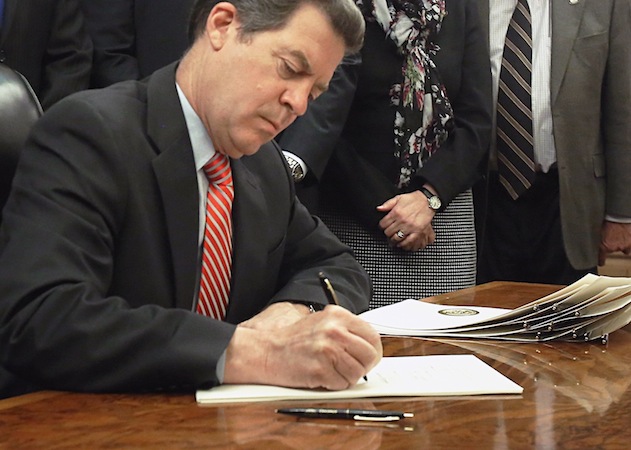TOPEKA, Kan. (AP) — A new Kansas law tells poor families that they can’t use cash assistance from the state to attend concerts, get tattoos, see a psychic or buy lingerie. The list of don’ts runs to several dozen items.
More than 20 other states have such lists. But, the one included by the Republican-dominated Kansas Legislature in a bill that GOP Gov. Sam Brownback planned to sign Thursday appears to be the most exhaustive, according to state Department for Children and Families officials.
It’s inspired national criticism and mockery from “The Daily Show.” Host Jon Stewart suggested that in accepting federal funds, Kansas should be forced to give up items like roads “paved with luxurious asphalt.”
“The list has attracted attention because it feels mean-spirited,” said Shannon Cotsoradis, president and CEO of the advocacy group Kansas Action for Children. “It really seems to make a statement about how we feel about the poor.”
It is part of a broader welfare law taking effect in July that Brownback and his allies say is aimed at moving poor families from social services into jobs.
“We want to get people off of public assistance and into private-sector employment, and we’ve had a lot of success with that,” Brownback during an interview this week with The Associated Press.
A 2012 federal law requires states to prevent benefit-card use at liquor stores, gambling establishments or adult-entertainment businesses.
At least 23 states have their own restrictions on how cards can be used, mostly for alcohol, tobacco, gambling and adult-oriented businesses, according to the National Conference of State Legislatures.
A few states — not Kansas — prohibit buying guns, according to the NCSL, and a few ban tattoos or body piercings. Massachusetts prohibits spending on jewelry, bail bonds, or “vacation services.” A 2014 Louisiana law bars card use on cruise ships, which is also on the Kansas list.
Kansas Department for Children and Families officials said that it’s difficult to track how often cash assistance is used for items on the state’s new list because recipients can use their benefits cards to obtain cash. The law will limit ATM withdrawals of cash assistance to $25 a day.
The department said it reclaimed $199,000 in cash assistance from 81 fraud cases from July through February, but said most involved questions about eligibility. The state provided $14 million in cash assistance during the same period.
A 2014 federal report said a check of eight states’ data showed transactions with benefit cards at liquor stores, casinos or strip clubs accounted for less than 1 percent of the total.
Critics question whether such restrictions can be enforced. Elizabeth Schott, senior fellow with the left-leaning Center on Budget and Policy Priorities, said enacting them simply creates an “aura of abuse.”
“Undermining support for the programs is what the restrictions do,” she said.
Phyllis Gilmore, Kansas secretary for children and families, said her state’s list is a “composite” of others and has educational value, sending the message that cash assistance should be used for necessities.
“Every dollar that is used fraudulently is a dollar that is not going to an American who is struggling,” said state Sen. Michael O’Donnell, a Wichita Republican who supported the bill.
Much of the new Kansas law codifies administrative policies enacted after Brownback took office in January 2011, so they’ll be harder to undo later.
They include a requirement that cash assistance recipients work at least 20 hours a week, be looking for work or enroll in job training. The new law also includes a much-criticized provision shortening the lifetime cap on cash assistance to 36 months from 48 months, although the state Department for Children and Families said recipients rarely bump up against the lower limit.
The number of cash assistance recipients in Kansas has dropped 63 percent since Brownback took office, to about 14,700 in February. Brownback said the decline confirms the success of his policies, but critics note that U.S. Census Bureau figures show the state’s child poverty rate remaining at about 19 percent through 2013.
Brownback said his state’s list of prohibited cash-assistance uses has become a way for the left to argue against welfare-to-work policies.
“I think you’re seeing the left trying to pillory this,” Brownback said. “They’re just trying to poke fun at it, when it’s not what the debate is really about.”
___
Online:
Text of Kansas welfare measure: http://bit.ly/1H8k7SD .
Kansas Legislature: http://www.kslegislature.org
___
Follow John Hanna on Twitter at https://twitter.com/apjdhanna
Copyright 2015 The Associated Press. All rights reserved. This material may not be published, broadcast, rewritten or redistributed.







That is very important dontcha think? Oy vey iz mir. The people who voted this guy back in deserve everything they get. They had a chance to kick his sorry ass out and instead they rewarded him.
Sorry Sam, but what this is really about is you and your GOP brethren being a bunch of pious, self-righteous assholes beating up on the poor to score points with your fellow tea party assholes.
I eagerly await the new laws where the government starts determining what’s “appropriate” food for people to purchase. This from the same party that rails against the “nanny state”.
Anyone who had anything to do with this law should have to live on cash assistance for 2 months.
Heartless bastards.
Uh oh, psychic stuff Governor…a slight pay downgrade unless you’re also wearing lingerie.
Kansas and most red states are welfare states. They take in more more federal dollars in than they send in. Can the blue states dictate what they can spend their welfare dollars on? Fair is fair, right?